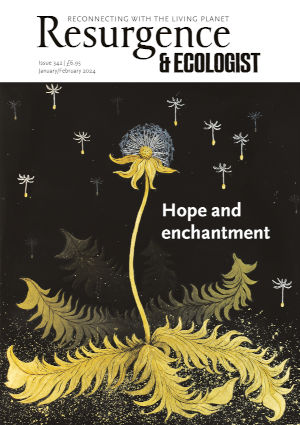Living in the present moment requires you to hold completely contradictory realities in your head at once. I accept the implications of climate science. I can see the unsustainability of our politics and our economy. I know what’s coming. Still, I get up in the morning. I pay into my pension. I take out a mortgage on a flat on a floodplain. All the evidence points us towards one kind of future, but I live as if there will be another.
From feeling the seasons slipping from the calendar to seeing all the graphs going the wrong way, there’s hardly any wonder why so many of us are struggling with mental health issues related to the biodiversity and climate crises. But if you are feeling alone in all this, Tori Tsui is here to reassure you that It’s Not Just You.
“Whatever negative emotions you are experiencing in response to climate change are not unjustified,” she tells us. “Let me reassure you that your feelings are valid, no matter how big or small.”
According to a recent global study, nearly 60% of young people are extremely worried about the future of the planet. This is a manifestation of what has come to be known as eco-anxiety, the ostensible subject of this book. Tsui kicks off by acknowledging that there are many overlapping and competing definitions of eco-anxiety, “but by far the most popular seems to elucidate a certain distress in response to climate change, with some emphasising a worry for the future”.
Tsui then spends a good chunk of the book interrogating this popular definition from a number of angles. The first is to point out that the focus on feeling anxious about some hypothetical, abstract future is a somewhat Eurocentric framing of eco-anxiety, erasing the emotional experience of the millions of people at the frontline of climate collapse right now. If eco-anxiety describes the fear of something that might happen decades hence, what is the word for watching the sea reclaim your coastal home and batter you by deadly storms, right here, right now? And how are we to describe the feelings of western activists still locating the true moment of disaster in the future?
Another section of the book explores the degree to which we can really separate any anxiety specific to the climate crisis from the general experience of living in the present economic and political moment. Indeed, Tsui wonders to what extent a response of despair and anxiety should be classified as mental ill health at all. Isn’t this just a normal reaction to the state of things as they really are?
Having spent most of the book prodding, poking, complicating and dismantling the experience we’ve come to know as eco-anxiety, the author doesn’t spend much energy in trying to reassemble a definition she can stand behind. Nor is it particularly clear that she has much interest in doing so. Instead, her central message is that for many, multifaceted reasons, it’s completely correct to feel anxious right now, and that the best thing we can do is to resist the individualism of contemporary culture, and find healing in collective action.
It’s Not Just You fizzes with the energy of the generation of activism from which Tsui has sprung, and its final passages constitute a borderline-optimistic call to action for a collective and intersectional response to the climate crisis. Not only could this heal the planet, but it could be what heals us too.
Tsui uses hope as a verb, calling on us to find community and connection, and then to take the necessary practical steps towards the better world that remains possible. This, perhaps, is why I still get up in the morning and pay into my pension. There is a future left to fight for, and taking action for a better tomorrow will do me good today.
It’s Not Just You: How to Navigate Eco-Anxiety and the Climate Crisis by Tori Tsui. Gallery UK, 2023. ISBN: 9781398508729







